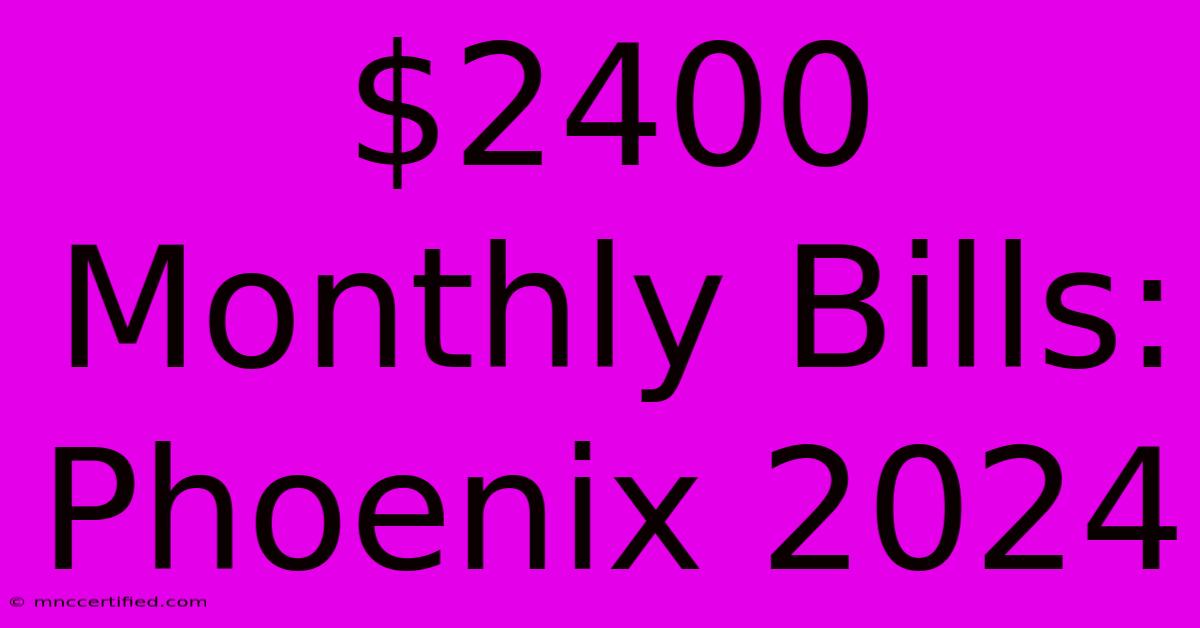$2400 Monthly Bills: Phoenix 2024

Table of Contents
$2400 Monthly Bills in Phoenix, 2024: A Realistic Breakdown
Facing $2400 in monthly bills in Phoenix, Arizona in 2024? This isn't uncommon, especially given the rising cost of living in this rapidly growing city. Understanding where your money goes is crucial to budgeting effectively. This detailed breakdown will explore potential cost contributors and offer strategies for managing your expenses.
Deconstructing the $2400: Potential Expense Categories
A $2400 monthly budget in Phoenix requires careful allocation. Let's examine the major expense categories likely contributing to this figure:
1. Housing ($1200 - $1800): The Biggest Chunk
Phoenix's housing market is competitive. Your $2400 budget likely dedicates a significant portion to rent or mortgage payments.
- Rent: Depending on location and apartment size, expect to pay anywhere from $1200 to $1800 for a decent apartment. Luxury apartments or homes in desirable neighborhoods will push this cost even higher.
- Mortgage: If you own your home, your mortgage payment could be a substantial portion of your $2400. This includes principal, interest, property taxes, and homeowner's insurance (often bundled together).
Tip: Consider exploring different neighborhoods to find more affordable housing options. Look beyond the city center for potential savings.
2. Transportation ($300 - $500): Getting Around Phoenix
Phoenix's sprawling landscape necessitates reliable transportation.
- Car Payment: If you have a car loan, the monthly payment adds to your expenses.
- Gas: Fuel costs can be significant, particularly with Phoenix's frequent traffic.
- Insurance: Auto insurance premiums in Arizona can be considerable.
- Public Transportation: While light rail and bus services exist, they might not be sufficient for all commutes, making car ownership more prevalent.
Tip: Explore carpooling or using public transport for some commutes to minimize gas and insurance expenses. Consider a more fuel-efficient vehicle if purchasing a new car.
3. Utilities ($200 - $300): Essential Services
Phoenix's climate influences utility costs.
- Electricity: Cooling costs during the scorching summers significantly impact electricity bills.
- Water: Water conservation is essential in Arizona's arid climate.
- Internet/Phone: Reliable internet and phone services are necessary for modern life.
Tip: Invest in energy-efficient appliances and practice water conservation to lower your utility bills. Compare internet and phone plans to find the best deals.
4. Food ($400 - $600): Groceries and Dining Out
Food costs can vary significantly depending on eating habits.
- Groceries: Plan your meals and shop strategically to manage grocery expenses.
- Dining Out: Limit restaurant visits to save money.
Tip: Cook at home more often, utilize grocery store coupons, and consider meal prepping to reduce food costs.
5. Healthcare ($100 - $300): Maintaining Well-being
Healthcare costs are a significant concern.
- Health Insurance Premiums: Health insurance can be expensive.
- Medical Expenses: Unexpected medical costs can quickly derail your budget.
Tip: Explore different health insurance options and maintain a healthy lifestyle to minimize medical expenses.
6. Other Expenses ($100 - $300): The Miscellaneous Category
This category encompasses various expenses.
- Entertainment: Movies, concerts, and other entertainment options.
- Personal Care: Clothing, toiletries, and other personal expenses.
- Debt Repayment: Credit card payments and other debt obligations.
Tip: Track your spending diligently to identify areas where you can cut back.
Strategies for Managing a $2400 Monthly Budget in Phoenix
- Create a Detailed Budget: Track your income and expenses meticulously.
- Negotiate Bills: Contact your service providers to negotiate lower rates.
- Seek Financial Advice: Consult a financial advisor for personalized guidance.
- Emergency Fund: Build an emergency fund to handle unexpected expenses.
Conclusion: Living within your means in Phoenix
Living on a $2400 monthly budget in Phoenix in 2024 requires careful planning and budgeting. By understanding your spending patterns and implementing effective strategies, you can navigate the challenges and build a sustainable financial future. Remember that this is a general guideline, and your specific expenses might differ. Careful planning and consistent monitoring are key to success.

Thank you for visiting our website wich cover about $2400 Monthly Bills: Phoenix 2024. We hope the information provided has been useful to you. Feel free to contact us if you have any questions or need further assistance. See you next time and dont miss to bookmark.
Featured Posts
-
Boxer Paul Bamba Cause Of Death
Dec 28, 2024
-
Fabianski Injury Latest Update
Dec 28, 2024
-
Paul Bamba Boxer Dies Aged 35
Dec 28, 2024
-
Detroit Tigers Add Gleyber Torres
Dec 28, 2024
-
Kessler Syndrome A Growing Space Threat
Dec 28, 2024